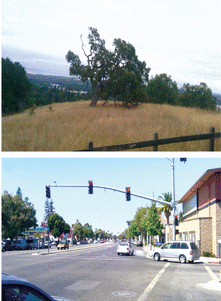Thursday, 22 February 2018
Walking in Nature Stops You from Brooding

If you can manage it, try to go out and walk a bit each day in a large park or other green space (not always easy in poor neighbourhoods. Why? Because yet another study, since the first one by Roger Ulrich in 1984, has confirmed the benefits of natural environments for reducing our tendency to ruminate (focus our thoughts repetitively on negative aspects of ourselves). This new study was done by Gregory Bratman and his colleagues. It is entitled “Nature experience reduces rumination and subgenual prefrontal cortex activation”, and it was published in the journal PNAS in July 2015.
Bratman’s study divided the subjects into two groups of 20 individuals. The individuals in the first group took a 90-minute walk in an urban setting, while those in the second did so in a natural setting (the two settings are shown in the photos above). Afterward, using a standardized questionnaire and functional magnetic resonance imaging (fMRI), the researchers found that the subjects who had taken their walks in the natural setting reported fewer negative thoughts about themselves and showed less neural activity in certain areas of the subgenual prefrontal cortex (sgPFC) and in a neighbouring area of the anterior cingulate cortex that had been associated in past studies with phenomena such as remorse, negative autobiographical narratives, and social rejection.
It should of course be kept in mind that these areas are part of a complex brain network and that it is always somewhat risky to try to attribute a functional significance to a variation in activity in a particular part of the brain. But the fact remains that these findings are highly consistent with those of many past studies showing just how much natural environments calm us and improve our mental health. And that should be no surprise: we humans evolved over very long periods in natural settings, compared with which urbanization is an extremely recent phenomenon. The high levels of stimulation, noise and social stress associated with urban life no doubt place heavy demands on our brains, which were wired for the peace and quiet of natural environments.
Body Movement and the Brain | No comments







